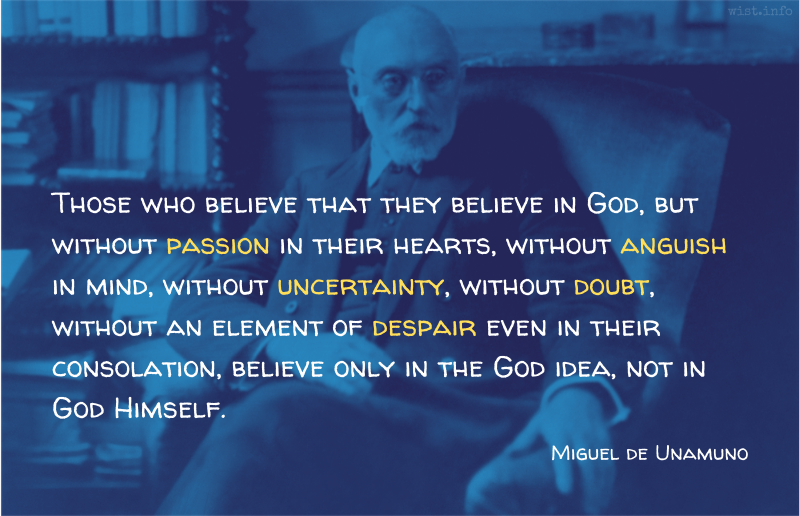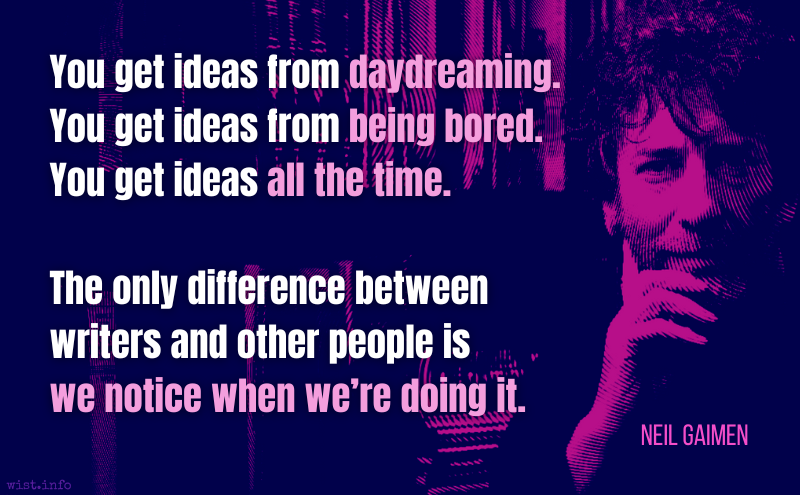There was a moment’s silence while everybody thought.
“I’ve got a sort of idea,” said Pooh at last, “but I don’t suppose it’s a very good one.”
“I don’t suppose it is either,” said Eeyore.A. A. Milne (1882-1956) English poet and playwright [Alan Alexander Milne]
House at Pooh Corner, ch. 6 “Eeyore Joins the Game” (1928)
(Source)
Quotations about:
idea
Note not all quotations have been tagged, so Search may find additional quotes on this topic.
I conceive that there is nothing which gives a man more pause before taking as absolute what his feelings welcome, and his mind deems plausible, than even the flicker of recollection that something of the sort has been tried before, felt before, disputed before, and for some reason or other has now quite gone into Limbo.
Learned Hand (1872-1961) American jurist
“Sources of Tolerance,” speech, University of Pennsylvania Law School (1930-06)
(Source)
Never try to convey your idea to the audience — it is a thankless and senseless task. Show them life, and they’ll find within themselves the means to assess and appreciate it.
If we establish a standard of safe thinking, we will end up with no thinking at all. That is the only “safe” way, and that is, needless to say, the most precarious, dangerous, of all ways.
Censors don’t want children exposed to ideas different from their own. If every individual with an agenda had his/her way, the shelves in the school library would be close to empty.
The distinction I am making — between studying astrology and proselytizing for it — is crucial and can be generalized; it shows us where the line between the responsible and irresponsible practice of academic freedom should always be drawn. Any idea can be brought into the classroom if the point is to inquire into its structure, history, influence and so forth. But no idea belongs in the classroom if the point of introducing it is to recruit your students for the political agenda it may be thought to imply.
Stanley Fish (b. 1938) American literary theorist, legal scholar, author
“Conspiracy Theories 101,” New York Times (23 Jul 2006)
(Source)
Ideas have consequences, and totally erroneous ideas are likely to have destructive consequences.
Steve Allen (1922-2000) American composer, entertainer, and wit.
More Steve Allen on the Bible, Religion, and Morality, “Authenticity of the Bible” (1993)
(Source)
A good question is never answered. It is not a bolt to be tightened into place, but a seed to be planted and to bear more seed, toward the hope of greening the landscape of an idea. The difference between a seed and an inert speck can be hard to see, but only one of them will grow and return itself in kind and be multiplied.
Nothing is more dangerous than an idea when it is the only one we have.
[Rien n’est plus dangereux qu’une idée, quand on n’a qu’une idée.]
Alain (1868-1951) French philosopher, journalist, pacifist [pseud. for Émile-Auguste Chartier]
Propos sur la religion, #74 (1938)
Alt. trans.: "Nothing is more dangerous than an idea, when you have only one idea."
Sometimes also quoted as "Rien n'est plus dangereux qu'une idée lorsque c'est la seule idée que vous avez."
Ideas come when we do not expect them, and not when we are brooding and searching at our desks. Yet ideas would certainly not come to mind had we not brooded at our desks and searched for answers with passionate devotion.
Max Weber (1864-1920) German sociologist, philosopher, political economist [Maximilian Karl Emil Weber]
“Science as a Vocation [Wissenscahft als Beruf],” Speech, Munich University (1918) [tr. Gerth & Mills (1948)]
(Source)
Alt. trans.:
- "Ideas come when they are least expected, rather than while you are racking your brains at your desk. But, by the same token, they would not have made their appearance if we had not spent many hours pondering at our desks or brooding passionately over the problems facing us." [tr. Livingstone]
- "[Ideas] come, at any rate, when one does not expect them, not while racking one's brains and pondering at one's desk. Of course, the ideas would not have occurred to us without our having been through the state of racking our brains and being engaged in impassioned questioning." [tr. Wells (2018)]
To say that an idea is fashionable is to say, I think, that it has been adulterated to a point where it is hardly an idea at all.
Murray Kempton (1917-1997) American journalist.
Part of Our Time, ch. 6 “The Day of the Locust” (1955)
(Source)
When we are tired, we are attacked by ideas we conquered long ago.
Friedrich Nietzsche (1844-1900) German philosopher and poet
(Attributed)
Frequently attributed to Nietzsche, starting in the late 1950s, but never cited and not found in any of his writings. More discussion here.
You sit at the board and suddenly your heart leaps. Your hand trembles to pick up the piece and move it. But what chess teaches you is that you must sit there calmly and think about whether it’s really a good idea and whether there are other, better ideas.
Every man is wise when attacked by a mad dog; fewer when pursued by a mad woman; only the wisest survive when attacked by a mad notion.
Robertson Davies (1913-1995) Canadian author, editor, publisher
Samuel Marchbanks’ Almanack (1967)
(Source)
The difficulty lies, not in the new ideas, but in escaping from the old ones, which ramify, for those brought up as most of us have been, into every corner of our minds.
John Maynard Keynes (1883-1946) English economist
The General Theory of Employment, Interest and Money, Preface (1936)
(Source)
“Why now,” said Tazendra. “There is an idea. What do you think of Kytraan’s idea, Piro?”
“It is one I had not thought of,” admitted Piro.
“And do you think it a good one?” said Kytraan.
“I must consider it.”
“Oh,” said Tazendra, “we have nothing against considering.”
“No, indeed,” said Kytraan. “I, myself, have been known to consider on occasion, and would scarcely begrudge another’s chance to consider.”
“That is good, then; I will do so.”
“And will you do so now?” said Tazendra.
“I am considering this very instant,” said Piro. .
“That is good,” said Kytraan.
“Yes. I could not tell, or I should not have asked,” said Tazendra.
“Then it is right that you asked.”
“Do you think so?”
“I am certain of it.”
“Well, then I am pleased.”
“And you should be. But, your pardon, I am considering.”
“Of course,” said Tazendra, falling silent.
Now when an American has an idea, he directly seeks a second American to share it. If there be three, they elect a president and two secretaries. Given four, they name a keeper of records, and the office is ready for work; five, they convene a general meeting, and the club is fully constituted.
[Or, quand un Américain a une idée, il cherche un second Américain qui la partage. Sont-ils trois, ils élisent un président et deux secrétaires. Quatre, ils nomment un archiviste, et le bureau fonctionne. Cinq, ils se convoquent en assemblée générale, et le club est constitué.]
Jules Verne (1828-1905) French novelist, poet, playwright
From the Earth to the Moon, ch. 1 “The Gun Club” (1865)
(Source)
If nature has made any one thing less susceptible, than all others, of exclusive property, it is the action of the thinking power called an Idea; which an individual may exclusively possess as long as he keeps it to himself; but the moment it is divulged, it forces itself into the possession of every one, and the reciever cannot dispossess himself of it. it’s peculiar character too is that no one possesses the less, because every other possesses the whole of it. He who recieves an idea from me, recieves instruction himself, without lessening mine; as he who lights his taper at mine, recieves light without darkening me.
Thomas Jefferson (1743-1826) American political philosopher, polymath, statesman, US President (1801-09)
Letter to Isaac McPherson (13 Aug 1813)
(Source)
An idea that is not dangerous is unworthy of being called an idea at all.
Oscar Wilde (1854-1900) Irish poet, wit, dramatist
“The Critic as Artist,” Part 2 [Gilbert], Intentions (1891)
(Source)
Every now and then a man’s mind is stretched by a new idea or sensation, and never shrinks back to its former dimensions.
The idea is like the seed corn; it grows imperceptibly in secret. When I have invented or discovered the beginning of a song …, I shut up the book and go for a walk or take up something else; I think no more of it for perhaps half a year. Nothing is lost, though. When I come back to it again, it has unconsciously taken a new shape, and is ready for me to begin working at it.
Johannes Brahms (1833-1897) German composer and pianist
Conversation with George Henschel
(Source)
Quoted in a letter to Herr and Frau von Herzogenberg in Max Kalbeck, ed., the Brahms-Gesellschaft collection of correspondence, Vol. 2 [tr. Bryant (1909)], as cited in John Alexander Fuller-Maitland, Brahms, ch. 3 (1911).
The best way to kill a new idea is to put it in an old-line agency.
Lyndon B. Johnson (1908-1973) American politician, educator, US President (1963-69)
(Attributed (1964))
(Source)
On assigning his War on Poverty programs to a new office (the Office of Economic Opportunity), reporting directly to the White House, rather than spreading it through existing federal programs and departments like Labor; Agriculture; or Health, Education, and Welfare.
Quoted in Rowland Evans, Jr., and Robert Novak, Lyndon B. Johnson: The Exercise of Power, ch. 19 "The Great Society" (1966).
Don’t dismiss a good idea simply because you don’t like the source.
H. Jackson "Jack" Brown, Jr. (b. 1940) American writer
Life’s Little Instruction Book, Vol. 2, #691 (1994)
(Source)
Those who believe that they believe in God, but without passion in their hearts, without anguish in mind, without uncertainty, without doubt, without an element of despair even in their consolation, believe only in the God idea, not in God Himself.
[Los que sin pasión de ánimo, sin congoja, sin incertidumbre, sin duda, sin la desesperación en el consuelo, creen creer en Dios, no creen sino en la idea de Dios, más no en Dios mismo.]
Miguel de Unamuno (1864-1936) Spanish philosopher and writer [Miguel de Unamuno y Jugo]
The Tragic Sense of Life [Del sentimiento trágico de la vida], ch. 9 “Faith, Hope, and Charity” (1912) [tr. Flitch (1921)]
(Source)
Alt. trans. [tr. Kerrigan (1972)]: "Whoever believes he believes in God, but believes without passion, without anguish, without uncertainty, without doubt, without despair-in-consolation, believes only in the God-Idea, not in God Himself."
Original Spanish.
In Unamuno's earlier, unpublished work Treatise on the Love of God [Tratado del amor de Dios], ch. 3 "What is Faith?" (1905-08) [tr. Orringer], he used this same phrase and surrounding text: "Those without passion in their soul, without anguish, without uncertainty, without doubt, without despair in consolation, think they believe in God; they believe only in the idea of God, but not in God Himself."
You get ideas from daydreaming. You get ideas from being bored. You get ideas all the time. The only difference between writers and other people is we notice when we’re doing it.
Neil Gaiman (b. 1960) British author, screenwriter, fabulist
“Where Do You Get Your Ideas?” (1997)
(Source)































